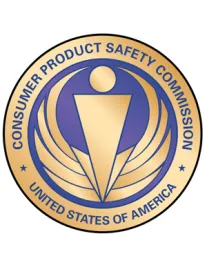The Recall Roundup is a monthly survey of regulatory activity affecting the manufacture, distribution, and sale of consumer products. In lieu of the usual monthly recap, this post summarizes key events from 2021. Subject matter may include the latest product recalls, federal agency major developments, and proposed or new federal rules. The blog’s goal is to provide an overview, rather than a comprehensive report, on every development that could potentially affect businesses or consumers. Nothing herein constitutes legal advice. If you have questions or comments about the blog, please reach out to the authors.
The Consumer Product Safety Commission (CPSC) pursued several enforcement actions in 2021 with wide-ranging implications for businesses. Highlights include the first-ever criminal action against a corporation (as opposed to an individual), two cases in which the target defendants claim that the CPSC is overstepping its regulatory authority, and two cases illustrating the critical role of product instructions or warnings in the CPSC’s assessment of an alleged product hazard. Other key developments in 2021 were the confirmation of two new CPSC Commissioners, the promulgation of a safety standard for infant sleep products, an increase in the maximum allowable civil penalties for violations of the Consumer Product Safety Act (CPSA), and the introduction of a new online tool for reporting hazardous products.
CPSA Enforcement Highlights
Criminal Charges for Violation of the CPSA
In late October, the Department of Justice (DOJ) resolved its first-ever criminal enforcement actions brought under the CPSA against corporations. The defendants were a Chinese appliance manufacturer (Gree Electric Appliances Inc. of Zhuhai) and two of its subsidiaries (Hong Kong Gree Electric Appliances Sales Co. Ltd. and Gree USA Inc.).
The Gree companies sold over two million dehumidifiers in the United States between 2007 and 2013, but learned in late 2012 that the dehumidifiers could overheat and catch fire. Despite receiving reports that their products were causing fires, the Gree companies waited approximately six months to notify the CPSC, continued to sell the dehumidifiers for at least six months, and ultimately recalled the dehumidifiers almost a year after learning of the potential defect, according to the DOJ. The DOJ charged the Gree companies with felony counts of willfully failing to report consumer product safety information to the CPSC.
Gree Zhuhai and Gree Hong Kong entered into a deferred prosecution agreement (DPA), while Gree USA agreed to plead guilty to the felony charge. Under the agreements, the Gree companies will pay a total of $91.2 million, which includes a $39 million forfeiture of “assets associated with their violation” of the reporting requirement and a $52.2 million monetary penalty. Other terms in the DPA and plea deal include agreements by the Gree companies to pay restitution to any individuals harmed, either through physical injury or financial loss, by fire or overheating caused by the dehumidifiers; to institute strengthened compliance and reporting procedures within the companies; and to cooperate in any ongoing or future investigations and prosecutions. Commenting on the charges, newly confirmed CPSC Chair Alex Hoehn-Saric stated, “[t]his historic criminal enforcement action should serve notice that the CPSC will use its authority to the fullest to keep American families safe.”
The DOJ previously indicted two company executives—the chief executive officer and chief administrative officer of Gree USA—for their alleged roles in the companies’ violation of the CPSA. Charges filed against the executives included “a multiple-object conspiracy to commit wire fraud, to fail to furnish information under the [CPSA], and to defraud the [CPSC],” as well as one count each of wire fraud and failure to furnish information to the CPSA. Both executives pleaded not guilty and the trials are scheduled for March 2022.
Residential Elevators
In July 2021, the CPSC targeted a residential elevator manufacturer to force the remediation of dangers allegedly posed by certain elevator models, based in part on the allegation that the installation instructions were defective and could lead third parties to install the elevators in a hazardous manner. By a 3-1 vote, the CPSC approved an administrative complaint against TK Access Solutions Corp. (TKAS, formerly known as thyssenkrupp Access Corp.), alleging some models of the company’s elevators constitute a substantial product hazard because children can become trapped in the space between the elevator car and elevator shaft doors, which can lead to serious injury or death if the elevator is called to another floor.
TKAS designed the elevators, manufactured components, and provided installation instructions, while third parties (such as local dealers and builders) acquired and assembled the elevators in accordance with homeowners’ specifications. The elevators are defective, the CPSC alleges, because the TKAS installation instructions do not sufficiently explain how to measure the space between the doors, which may lead to improper installation by third parties, and because the design of the elevators allows the elevators to move while a child is trapped between the doors.
TKAS moved to dismiss the complaint on several grounds, arguing that neither the component parts that TKAS manufactured, nor the finished home elevators, are consumer products under the CPSA, that the CPSA is engaging in an improper retroactive application of a voluntary standard relating to residential elevator installations, and that the action is moot because “the Company is already taking all of the actions the Complaint seeks to compel, except those actions that are beyond the Commission’s authority to order.”
Amazon.com, Inc
In a development with significant implications for the CPSC’s ability to regulate the e-commerce space, an administrative law judge has ruled that Amazon.com, Inc. (Amazon) acts as a “distributor” under the CPSA with respect to products that reach consumers through the “Fulfillment by Amazon” (FBA) Program. The issue arose in the context of an administrative enforcement action brought by the CPSC (in July 2021, which was approved by 3-1 vote) seeking to force Amazon to remediate dangers allegedly posed by certain products sold through the FBA program. In the administrative complaint, the CPSC alleges that the products, which include children’s sleepwear garments, carbon monoxide detectors, and hair dryers, constitute “substantial product hazards.” Although Amazon has already moved to address the issue by notifying consumers who purchased the products of the potential hazards and offering refunds in the form of an Amazon gift card, the CPSC argues these actions are “insufficient” under the CPSA’s mandatory corrective requirements for hazardous products.
Amazon’s classification as a “distributor” is a crucial issue because “distributors” of consumer products are subject to CPSA recall requirements and the CPSC’s related authority. On the other hand, “third-party logistics providers”—the classification Amazon has argued applies—are excluded from the Act’s requirements with respect to substantial product hazards (as are common carriers, contract carriers, and freight forwarders). See 15 U.S.C. §§ 2052(b), 2064. Under the CPSA, a “distributor” is defined as “a person to whom a consumer product is delivered or sold for purposes of distribution in commerce, except that such term does not include a manufacturer or retailer of such product,” 15 U.S.C. § 2052(a)(8), while a “third-party logistics provider” is defined as “a person who solely receives, holds, or otherwise transports a consumer product in the ordinary course of business but who does not take title to the product.” 15 U.S.C. § 2052(a)(16).
Complaint Counsel moved for partial summary decision on the threshold legal issue, and the presiding officer granted the motion by order on January 19, 2022. Amazon had opposed with its own motion to dismiss and, in the alternative, for summary decision, arguing additionally that the CPSC improperly seeks to expand the definition of “distributor” through an adjudication rather than a rulemaking in violation of the Administrative Procedure Act (APA) and Due Process Clause, that the CPSC improperly seeks to apply a new rule retroactively, and that the proceeding is moot based on Amazon’s prior remediating actions. The presiding officer denied these additional arguments, ruling that the case was not moot, and that the APA, Due Process, and retroactivity arguments were premature.
Magnets
The CPSC continued its long-running effort to curb the dangers associated with high-powered magnets in 2021, making progress in two key enforcement battles. In one, the CPSC finally succeeded in forcing a relatively rare mandatory recall after a 9-year battle with a magnet manufacturer. In the other, the CPSC mounted its second attempt at promulgating a safety standard for magnets after the Tenth Circuit rejected its first attempt.
The magnets at issue are small spherical balls, generally sold as a set, which users may rearrange into various shapes. After receiving reports of ingestion by children in the early 2010s, including an incident requiring surgical removal, the CPSC initiated regulatory action to investigate and mitigate dangers the magnets pose to consumers. That effort, which has now spanned more than a decade, has involved multiple fronts, including a public awareness campaign, negotiations with manufacturers and distributors of the magnets over recalls, federal rulemaking, and targeted administrative enforcement actions.
The 2021 recall marks the end of nearly a decade of litigation. The CPSC filed administrative complaints in 2012 against Zen and two other importer/distributors of similar high-powered magnets, seeking orders finding that the magnets constituted substantial product hazards under the CPSA and directing the firms to take appropriate remedial actions. While the two other companies agreed to settle, Zen chose to contest the issue.
In March 2016, Zen won an initial, partial victory when an administrative law judge concluded that, while certain magnets sold without warnings or with inappropriate age recommendations constituted substantial product hazards, those sold with appropriate warnings and age recommendations did not pose a significant risk when used properly. Thus, Zen only had to recall certain magnets, but was free to continue to sell those with sufficient warnings.
On appeal, however, the CPSC reversed the ALJ’s determination. In its October 2017 Final Decision and Order, the CPSC found that the magnitude and likelihood of dangers associated with the magnets’ “reasonably foreseeable misuse” created a substantial product hazard notwithstanding the magnets’ safety when used properly and any mitigating effect of a warning. The CPSC thus ordered Zen to cease any manufacturing, importation, distribution, or sale of the magnets, a decision ultimately upheld by the Tenth Circuit. See Zen Magnets, LLC v. Consumer Prod. Safety Comm’n, 968 F.3d 1156 (10th Cir. 2020). With its decision finally affirmed, the CPSC issued a rare mandatory recall of ten million high-powered five-millimeter spherical magnets.
Regarding the safety standard, the CPSC voted unanimously in December to approve a notice of proposed rulemaking (NPR) establishing a limit to how powerful certain small magnets can be. This NPR is the CPSC’s second attempt at promulgating a safety standard for this category of magnets. The CPSC published a similar rule in 2014, but Zen (Yes, the same Zen.) challenged it, and in 2016 a Tenth Circuit panel vacated the rule, finding that the CPSC had not sufficiently addressed “critical ambiguities and complexities” in the data supporting its cost-benefit analysis. See Zen Magnets, LLC v. Consumer Prod. Safety Comm’n, 841 F.3d 1141, 1148 (10th Cir. 2016). A draft of the new NPR can be found here (the CPSC approved this draft NPR with the sole amendment that the final rule would go into effect within 30 days of its publication, rather than the maximum allowable period of 180 days).
Other News
Infant Sleep Rule
In June 2021, the CPSC approved a new federal safety standard for infant sleep products, which will take effect June 23, 2022. Under Section 104(b) of the Consumer Product Safety Improvement Act of 2008 (CPSIA) (15 U.S.C. § 2056a), the CPSC is required to promulgate and regularly update safety standards for “durable infant or toddler products,” such as cribs, bath seats, or strollers. Any standard the CPSC enacts under this section must be substantially the same as any applicable voluntary consumer product safety standards, or more stringent than the voluntary standards “if the Commission determines that more stringent standards would further reduce the risk of injury associated with such products.” 15 U.S.C. § 2056a(b). The rule in this case is more stringent than the parallel voluntary standard, and requires that infant sleep products not within existing CPSC standards must be tested to confirm that the angle of any inclined sleeping surface is no greater than 10 degrees, and that the product conforms with the CPSC’s Safety Standard for Bassinets and Cradles.
New Online Reporting Tool
The CPSC launched a new online reporting tool in December 2021 to streamline the hazardous product reporting process. The new system combines several features to make it easy and efficient for firms to navigate the recall process. Companies can upload their initial report and submit any additional documentation through the system and will “receive an emailed copy of all information submitted to CPSC through the system, along with emailed case updates, deadline reminders and contact information for the CPSC staff handling their report.” The tool has also been updated with “a user-friendly interface that includes hover-over features and guidance for firms to navigate the submission process” and is accessible through users’ smart phones or tablets.
While the new system will be available for use in every recall going forward, any business wanting to participate in the Fast Track Recall Program will be required to use the new tool beginning January 31, 2022. Under the Fast Track Recall Program, the CPSC will refrain from making a “preliminary determination” that the product contains a defect creating a substantial product hazard if the company meets certain requirements, such as immediately stopping sale of the product, filing a proposed corrective action program, and rapidly implementing a recall (generally within 20 working days, although the CPSC may extend the timeframe if it believes it to be necessary). The Fast Track program thus expedites the recall process by eliminating the time- and resource-consuming preliminary determination step while “rewarding” fast-moving companies wishing to avoid any perceived negative consequences of a CPSC determination that their product constitutes a substantial product hazard.
Civil Penalties Increased
In December, the CPSC raised the maximum civil penalty amounts that it may impose for violations of the CPSA to $120,000 for a single violation (up from $110,000) and $17,150,000 for any related series of violations (up from $16,025,000). Under the Consumer Product Safety Improvement Act of 2008 (CPSIA), the CPSC is required to revise the civil penalty maximums every five years proportionally to the corresponding increase in the Consumer Price Index.
In connection with the increase, CPSC Commissioner Peter Feldman released a statement expressing concern that “the current maximum civil penalty caps, even as adjusted, may leave the CPSC with insufficient tools to enforce against large e-commerce platforms, some of which measure their annual revenue in the hundreds of billions of dollars.” While acknowledging that “[t]he purpose of CPSC’s statutory civil penalties is to deter and punish safety violations, not to put any company out of business,” the Commissioner suggested that “it now may be time to rethink the agency’s maximum civil penalty caps.” The new civil penalty maximums took effect January 1, 2022.
CPSC Confirmations
The US Senate confirmed two new commissioners to the US Consumer Product Safety Commission (CPSC) in 2021—Alexander Hoehn-Saric and Richard Trumka, Jr. The Senate confirmed Hoehn-Saric, as the new Chair of the CPSC in October. Hoehn-Saric previously served as Chief Counsel for Communications and Consumer Protection for the US House of Representatives’ Committee on Energy & Commerce. Trumka was confirmed in November. Prior to joining the CPSC, Trumka served as General Counsel & Staff Director of the Economic and Consumer Policy Subcommittee of the US House of Representatives’ Committee on Oversight and Reform. With these two confirmations, the CPSC is composed as follows:

Thus, the current political balance of the CPSC is neutral, with two Republican and two Democratic members. President Biden has nominated Mary Boyle, who currently serves as the CPSC’s executive director, to fill the final vacant position. If the US Senate confirms Boyle, Democrats will secure a 3-2 majority on the CPSC, with the earliest term expiration for a Democratic member not arriving until 2027.
December Recalls
Total Recalls: 20
Hazards: Fire/Burn/Shock (7); Asphyxiation/Strangulation/Choking (5); Entrapment (4); Laceration (3); Fall (2); Crash (2); Federal Standards (2); Ingestion (1); Drown (1); Impact Injury (1)






 />i
/>i
